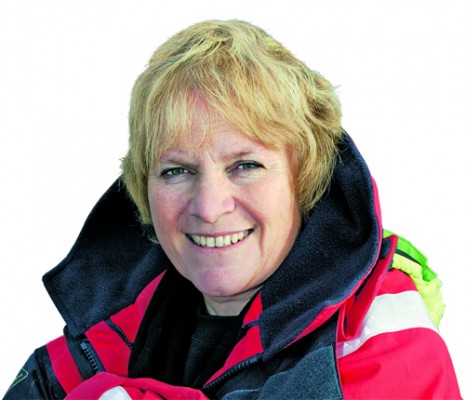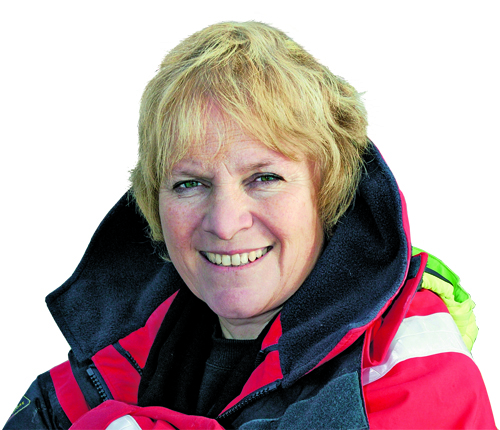The Contessa 26 is about to have her 50th birthday. the secrets of her success? Simplicity and seaworthiness reckons Libby Purves
Years ago when we were young, we went to a few yacht club meets in our Contessa 26, Barnacle Goose. All the other boats were much bigger and grander, with full ovens and showers and sprawling cabins. But when the owners of the grand 40-footers, older than us, clambered over our rail for a drink, they would look around with fond, dewily nostalgic eyes. ‘Aaah…yes… those were the good times!’
This baffled us a bit, as we craned across them to reach the drinks locker, perched on the temporary plank seat linking the chart table and galley, and hoped they wouldn’t want to use the somewhat exposed heads. But they were sincere in their emotion.
“Honest simpicity combined with elegant, swift-lined seaworthiness”
It wasn’t just remembering being young and newly-wed and able to hop in and out
of forehatches without grunting: it was the boat itself. Its simplicity, the honest straightforwardness combined with the elegant, swift-lined seaworthiness and long steady keel. Many of them had had Folkboats – the nearest relative to David Sadler’s brilliant Contessa 26, and they remembered those qualities.
So they mourned their past: the sorriest were those who had succumbed to a fat-beamed, lightweight fin-keeled Continental suntrap style boat, because the family reasonably demanded more and wider berths and standing headroom. The best small boats, after all, obey the golden rule that if you imagine them ten times the size, their shape still looks good.
But even among the owners of elegantly traditional long-keelers ten or 20 feet longer, there were sighs. Because a smaller boat is simpler. Fewer seacocks, less wiring, not so many things to go wrong. You’re more likely to have a nice manual galley-pump than an electric one, which buzzes and fails. Your water tank is smaller, so more frequently flushed through. All your handholds and grabrails are always within reach, not five feet away across an expanse of unnecessary upholstery.
Below decks, you carry fewer clothes and oddments because there isn’t much space, so everything in sight is seamanlike and practical: you never feel you have dragged the preoccupations of home away with you. You feel neat and purposeful because the boat is. As for the lack of standing headroom, the Contessa had what you might call trouser-putting-on headroom. In big seas, we quite often hove to at change of watch to keep things comfortable.
It was easy. Smaller sails are easy. For not only are you still young and strong in your Contessa or Folkboat days, but everything is lighter.
Changing a jib is quick. When coming alongside, the crew can step blithely onto the pontoon, which is almost level with the topsides, and if necessary hold the boat in by the shrouds while the lines are sorted. All those memories we could sense in the fond looks of the older, grander, visitors as they returned to their smart ships.
The first time I realised the full glory of the class was a year before we got one of our own: arriving on a large, unwieldy boat in Barbados after an Atlantic crossing, I fell in with a young couple and their ten-year-old daughter who had made the same trip in a Contessa 26. The child was doing her homework at the chart table, and had a cosy home in the forepeak; the parents were the most carefree people in the harbour because they had far fewer things to mend. The wife was sewing up a small rent in the working jib, the husband giving the topsides a wipe.
A few years later, happy with our own version, we read Tania Aebi’s lovely book Maiden Voyage. She sailed round the world in C26 Varuna, after her father lost patience with her and suggested she sail off and sort herself out. With youthful nerve and a pet kitten, she did it. But reading
the book it was not only the lairy teenager we applauded, but the boat. They look after you, those 26-foot, big-hearted giants of the sea.
Libby Purves
Libby Purves June 2016 podcast
Years ago when we were young, we went to a few yacht club meets in our Contessa 26, Barnacle Goose.…
Libby Purves May 2016 podcast
North or South, that is the question: whether ’tis nobler in the yachtsman to seek the sleet and icebergs of…
Libby Purves April 2016 podcast
I have been brooding about harbours, what we cruising yachtsmen want and what we ought to tell the industry, our…
Libby Purves March 2016 Podcast
It’s been like hospital visiting, this winter. Major abdominal surgery, complications, expert consultants called in, conferences about treatment plans, unfamiliar…





